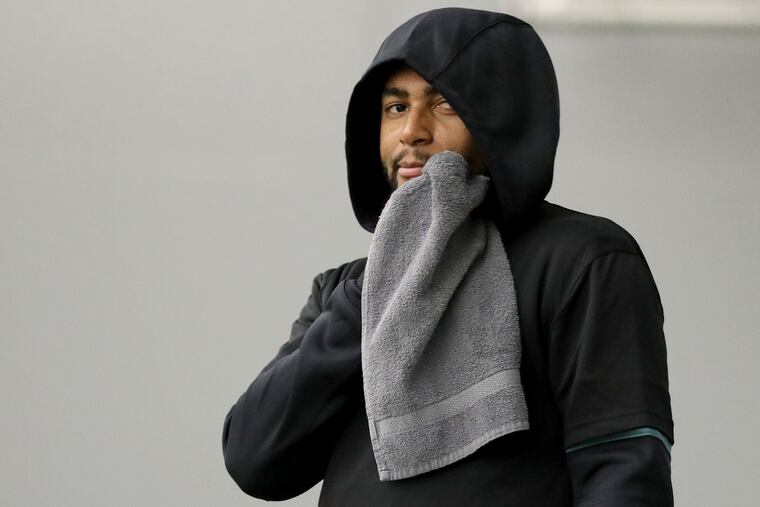DeSean Jackson had every right to avoid surgery if that was his decision | Bob Ford
The Eagles are just renting his body. He owns it.

There are facts regarding the saga of DeSean Jackson’s “core muscle injury” that can’t be disputed. There are also some conclusions being drawn from those facts that are without basis. It might seem an inopportune time to defend Jackson’s decisions regarding his medical condition, but we’re going to take a swing at it, anyway.
First, the facts. Jackson suffered the injury against the Atlanta Falcons on Sept. 15 and played just 11 snaps. Even that is an assumption, of course. He might have aggravated an existing injury that occurred before the game, whether in practice or even in the opening win over Washington in which Jackson caught eight passes for 154 yards, including two touchdowns that each covered more than 50 yards. Hard to say, and even Jackson might not be aware exactly when the problem began.
After the Falcons game, the Eagles termed the injury a “groin” injury before re-labeling it an “abdominal” injury. In fact, it is probably both. The oblique muscles in the lower abdomen are attached to the pubic bone, and when those muscles are stressed by sudden, explosive movement, particularly twisting movement, they can tear.
The injury is most commonly termed a “sports hernia,” and is a favorite of soccer players and NHL goalies, but the Eagles went with the broader “abdominal” injury. Not that it matters what it is called.
There are two surgical options for sports hernias: yes and no.
After conferring with doctors — some of whom are employed by the Eagles, and some of whom were consulted from outside the organization — Jackson opted not to have surgery. The timetable for resuming normal activity after rehabilitation without surgery is usually 6-8 weeks. The timetable after surgery is 6-12 weeks, with the longer window because there are things that can go wrong with surgery.
Personally, I missed the week in journalism school when they taught orthopedic surgery, but the difference between the two options looks pretty slim, if all goes well. There are certainly varying degrees of severity to take into account, but it’s also true that no one ever got an infection from a surgery he didn’t have.
So, Jackson did his six weeks of rehabilitation, returned to practice and was back on the field Sunday against the Bears … for four snaps. That’s all it took for the injury to take him out of the game again. It was reported that the tear was more severe this time, with the muscle pulling completely away from the bone. The Eagles neither confirmed nor denied that report.
Jackson underwent surgery Tuesday, and was placed on injured reserve, which almost certainly means the end of his season. He has to be on the list for eight games, which means a return couldn’t take place until the second round of the playoffs.
The way this played out was interpreted thusly by some corners of the Eagles’ fan base and perhaps among some within the organization as well:
1. DeSean Jackson was selfish not to have surgery initially, and put himself ahead of the team.
2. DeSean Jackson would be back catching 50-yard touchdowns if he had surgery in September.
3. DeSean Jackson was afraid of surgery and, therefore, is a fraidy cat.
Well, nonsense. To begin with, the Eagles are renting Jackson’s body — at a steep price, but renting it nonetheless — and it is his to live with the rest of his life. The team has no right to insist he do anything, and he has every right to make his own call.
What he did was bet on himself, which is something elite athletes do all the time. He bet he could work his way back himself, work his way back stronger, work his way back quicker, and avoid any possible, very real, complications that can arise from any surgery.
As for the 50-yard touchdown passes Jackson would be catching right now had there been a September surgery, let’s consider the lesson of Mike Wallace.
The Eagles signed Wallace last season to be their deep threat and, with a 4.33 time in the 40-yard dash, and 538 career receptions, what could go wrong?
Well, a lot. Just like Jackson, Wallace was injured early in the second game of the season. He broke his right fibula, the small leg bone that attaches to the ankle. The fracture was non-displaced, according to the team, and that meant there were two surgical options: yes and no.
For reference, Donovan McNabb didn’t have surgery for a broken fibula in 2002, did his six weeks in a boot and then two weeks of physical therapy, before returning for the divisional round of the playoffs. That’s the non-surgical option, similar to the path Jackson chose.
Wallace, maybe at the behest of the team, had a screw surgically implanted to repair the fibula, was given a recovery timetable of 8-10 weeks, and guess when he played again? If you guessed “never,” you win. After missing 13 games (and 14 weeks), Wallace came off IR before the final regular-season game, but didn’t practice well enough to be activated for that game or either playoff game. That’s the surgical option.
Don’t misunderstand. Jackson lost his bet. He turned out to be wrong, but he could also have been wrong for all the right reasons. Plus, it was his call.
By the way, Mike Wallace is an available free agent. He might be ready by now.